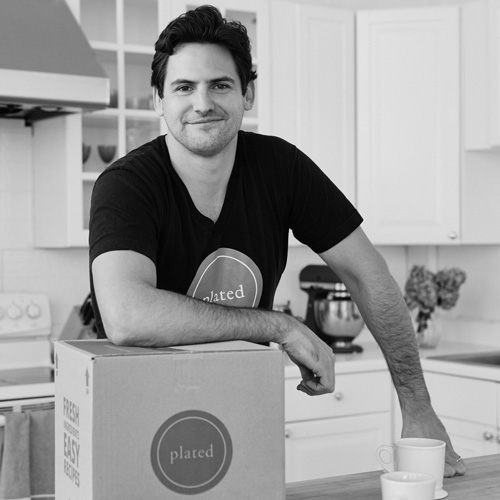When frozen-food culture started to peak in the 1950s, convenience was the buzzword of the era, as the shiny new technology liberated housewives from the burdens of cooking. It was a golden age of fish sticks and frozen pizzas, and today, much to the horror of the rapidly growing organic, slow food movement—not much has changed. Aisles across America’s grocery stores remain largely stuffed with complete dinners that often offer no explanation of where the ingredients come from or how they are processed. Or worse, the plethora of ingredients conventional frozen entrees contain are dosed with unhealthy levels of salt, sugar, calories, artificial ingredients, additives, or hydrogenated oils.
Enter Adnan Durrani, a serial entrepreneur responsible for investing in and elevating small, niche natural food and beverage brands into major household names. Durrani entered into the natural food sector almost thirty years ago, armed with the goal of creating and bolstering brands that make environmentally friendly and all-natural, organic products. He is now making waves with his newest brand—Saffron Road—and its line of global halal cuisines.
When Durrani started his journey into natural foods several decades ago via the venture capital firm Condor Ventures, the organic-food business wasn’t quite at the capacity that it is today, cultivating less than 10 million dollars in sales in the early nineties, he says (today, it has surged to $35 billion). Durrani quickly latched on to the growing national interest and felt compelled to contribute to a food industry that was increasingly transparent about where food was sourced and how things were made. After guiding three other premium brands (including bottled water in recyclable bottles, organic yogurt, and the first organic fruit-juice sweetened cookies/snacks) from obscurity to mainstream success, Durrani looked to the frozen entrées category for his next project—an area he believed was in dire need of improvement when it came to quality control, authenticity, culinary excellence, and ethical sourcing practices.
“Six or seven years ago, I was looking at the landscape of the food industry, and I felt that there wasn’t a lot of ethical consumerism going on in those freezer cases,” Durrani says. “There wasn’t a single
national brand that was antibiotic free when we launched, so we wanted to have an innovative and disruptive impact by elevating the prevalent conventional standards on the frozen shelf.”
In 2010 Saffron Road debuted a frozen entrée brand produced in a way that promotes sustainability and ethical consumerism. It is also the first national frozen entrée brand that is halal certified (the Muslim equivalent to kosher). For every product in the product line, with cuisine options ranging from Indian and Thai to Moroccan and Korean, the meat is sourced from family owned, sustainable farms, with livestock humanely raised on 100 percent vegetarian feed without being administered any antibiotics. The company boasts fifteen non-GMO products and thirty certified gluten-free products, with more slated to join that line-up in the future. “All of those things can look like they’re just kind of marketing certifications, but they are endemic to our mission,” Durrani says. “We are passionate about what we do, and at the end of the day we feel comfortable that what we’re doing is impacting the world and our global food ecosystem in a positive way.”
Unlike most of Saffron Road’s frozen-food competitors, Durrani doesn’t just want to make blind claims on the company’s packages. The way they stay bulletproof in terms of validating the company’s values of purity and transparency is by going through the grueling and costly process of major third-party certifications. These certifications help Durrani sleep well at night, knowing his company is following ethically sound guidelines, but they undoubtedly help drive new business as well, due to the “bond of trust they embolden in Saffron Road’s consumers,” he says.
Who are the company’s biggest consumers? While many other brands on the market aim to appeal to faithful frozen-food fans in the baby boomer generation, Saffron Road taps into a market of more savvy, younger consumers who want to know their food is being produced in an ethical way: the growing millennial demographic. “We had a gut instinct that there was a consumer out there looking for these products. They tend to travel, are well educated, very social media savvy, focused on health and wellness, prefer organic foods, and are into authentic world cuisines,” Durrani says. “We’re hitting a good sweet spot there that many larger companies are missing.”
In addition to hitting all the right points in relation to topics like the movement away from GMOs, antibiotic-free practices, and certified humane livestock, Durrani says he also wanted to set a new bar for culinary excellence in the frozen sector. For example, for the most recent line of Korean plates, Saffron Road partnered with Annie Chun, a well-known American-Korean culinaire and founder of the leading Korean national entrée brand by her namesake. The efforts are paying off, as a handful of well-respected publications and food personalities have since endorsed the products. Saffron Road has seen accolades in Every Day with Rachael Ray, Shape, Fitness, Glamour, and other magazines.
Another area where Saffron Road is leading change is with its next big product for the future—“skillet sauces,” as Durrani calls them—pouches of simmer sauces that can be used to kick-start a meal that doesn’t come from the frozen section. Currently the only non-GMO certified skillet sauces in the country, the products come in a range of flavors from lemongrass basil to tikka masala, and are packaged in plastic pouches. The pouches are one-third the weight of glass, Durrani says, so the system creates a much friendlier environmental footprint as well.
Why aren’t more frozen food companies looking to these seemingly simple solutions to revamp their images and attract new customers? Durrani says for many, it’s simply an issue of cost. “It requires sourcing from unique suppliers, and that’s something that most large companies aren’t willing to sacrifice to give consumers that choice.” For Saffron Road, the extra costs are simply the price of doing business.
And business is booming. According to AC Nielson, Saffron Road is the fastest-growing entrée brand in the country, and it is currently growing at a triple-digit rate. Others in the frozen-food sector are seeing record losses in revenue, Durrani says, with sales from major brands like Nestle and ConAgra diving an average of 20–25 percent. While some may believe this overall decline might benefit Saffron Road, Durrani would rather see the other “big companies” maintaining a healthy presence on the shelves so the industry can continue to grow and evolve as a whole.
With companies like Saffron Road spearheading change on both the dry shelves and in frozen-food aisles, it’s likely only a matter of time before more large food-production companies take a stronger interest and start to dive into the same organic, natural options. Perhaps walking up and down the frozen-food aisles of the future, we’ll see a lot less of the old TV dinner model, and a lot more products that not only taste great and are better for us, but that are made in a way that’s sustainable for the future of food production as a whole. And in many ways, we’ll have Adnan Durrani to thank.
For an in-depth look at how Durrani built the Saffron Road brand, click here.

